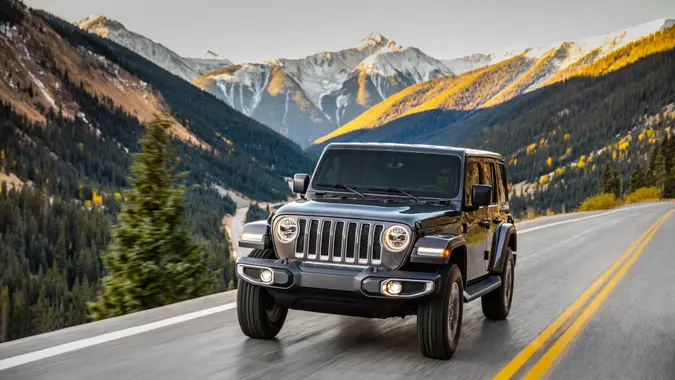5 SUVs Retirees Should Avoid Buying in 2025

Commitment to Our Readers
GOBankingRates' editorial team is committed to bringing you unbiased reviews and information. We use data-driven methodologies to evaluate financial products and services - our reviews and ratings are not influenced by advertisers. You can read more about our editorial guidelines and our products and services review methodology.

20 Years
Helping You Live Richer

Reviewed
by Experts

Trusted by
Millions of Readers
When choosing a new vehicle, retirees on a fixed income should look for models that suit their budget and lifestyle. When it comes to buying SUVs, factors to consider include quality of use, comfort and affordability. But some SUVs will not satisfy these criteria due to excessive maintenance costs, poor fuel economy and features that are not so easy to use.
With that in mind, here are five SUVs retirees should steer clear of in 2025, considering some issues they might have for older drivers.
Jeep Wrangler: Rugged but Impractical
Despite rugged styling, the 2025 Jeep Wrangler is problematic for retirees. Edmunds offered insights into how its high step-in height makes it difficult to get in and out, especially for shorter drivers and those with mobility issues. Road imperfections are made even more uncomfortable by rough suspension tuning.
The limited cargo space also limits practicality for medical equipment or travel essentials to be stored. Edmunds added that Wrangler’s steering and lazy acceleration fall behind conventional SUVs when it comes to on-road experience.
If you are looking for better comfort and usability and want to retire as an explorer, then the Subaru Outback is an SUV to consider.
BMW X5: Luxury With Steep Costs
To own a BMW X5 requires deep enough pockets to keep it running. CarEdge estimated an $19,514 total cost to own this SUV over 10 years, and the car has a 56.41% chance of a major repair. Specifically, BMW’s German-made parts, labor and recurring items such as routine oil changes cost more than rivals not in the luxury space, according to expert David Loo, operations manager at Xpro Auto Glass.
The BMW X5’s ownership costs extend beyond routine maintenance, with common issues like oil leaks and power steering control module failures necessitating expensive fixes. According to RepairPal data, these repairs can cost more than $1,800 per incident for more serious issues, and that strains retirees’ budgets.
If you’re looking for a luxury SUV in retirement, consider buying a more reliable vehicle with a stronger resale value.
Ford Explorer: Leasing Pitfalls
Retirees living on a fixed income likely cannot afford the 2025 Ford Explorer’s $39,785 starting price. Edmunds warns of reliability problems with the transmission and safety recalls negatively influencing long-term ownership costs.
With an 18 mpg city fuel efficiency, it loses to competitors of this type, putting a strain on budgets, especially for those taking frequent trips. Safety concerns arise from four active recalls, including power loss and airbag warnings.
Alternatives such as the Honda HR-V should be given priority by retirees when it comes to low cost and proven reliability.
Volkswagen Tiguan: Frustrating Tech
Consumer Reports wrote that Volkswagen’s 2025 Tiguan’s complex infotainment system plays havoc with lots of users. Drivers are distracted from the road by the touch-sensitive climate controls and the menu-heavy interface.
Older drivers used to physical buttons, such as unlit temperature sliders and fiddly menus, become especially confused, according to Loo. Removing physical climate controls makes users navigate around screens while driving, which is one of the biggest accident risk factors.
Even with a horsepower increase to 184 hp, the Tiguan’s $28,880 launch price may not represent good bang for the buck vs. more user-friendly alternatives, like the Volkswagen Taos.
Toyota 4Runner: Fuel Inefficiency
Loo said the Toyota 4Runner isn’t a good choice for an SUV in that class for its fuel efficiency. The 2024 model gets 16 mpg in the city and 19 on the highway, which compounds quickly if miles are many. High fuel consumption is exacerbated by its outdated powertrain and heavy body.
“Gas prices go up, and this SUV guzzles more fuel than newer cars, so this is an expensive option for retirees in the long run,” Loo explained.
While the new turbocharged engine and hybrid options offer better efficiency than the previous generation’s 17 mpg combined, the 4Runner’s fuel economy remains mediocre compared to modern crossovers.
And the improved efficiency comes with significant price increases: The 2025 4Runner starts at $40,770. Retirees seeking better fuel economy and value might consider more efficient alternatives in the midsize SUV segment.
 Written by
Written by  Edited by
Edited by 

























